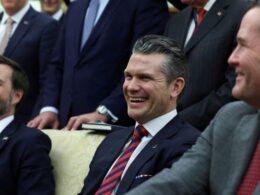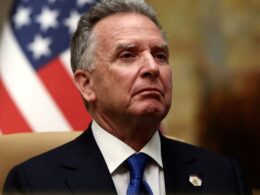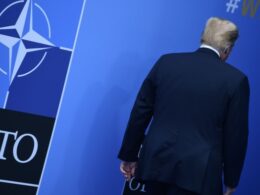Unlock the Editor’s Digest for free
Roula Khalaf, Editor of the FT, selects her favourite stories in this weekly newsletter.
The Taco trade is the most popular feast in markets right now, but it still leaves a peculiar taste in the mouth.
The term, coined by my esteemed colleague Robert Armstrong, encapsulates the notion that Trump Always Chickens Out, particularly in relation to his beloved trade taxes, and that risky assets rise in response.
It pains me to admit that Rob came up with something so witty and apt before I could think of it, but he is spot on. The key piece of evidence was on April 9, when the US president “paused” the supersized tariffs that he had outlined a week before, on what he termed “liberation day”. Markets gagged on the details and he backtracked, at least in part.
Then Trump upped the ante against Jay Powell, suggesting that he would seek defenestration of the Federal Reserve chair. Again, markets puked, and the president swiftly distanced himself from the whole idea.
The latest came in relation to China. Talks over trade a week ago in Switzerland produced what Bank of America is calling the “Geneva Prevention” — a commitment to roll back tariffs on China.
This last Taco is the one that really fired markets up this week. US stocks completed their recovery from the early April lows and indeed wiped out all their losses for this year with some very impressive gains, as if none of this madness had ever happened.
“The swift rebound means equities have moved from pricing a sharp slowdown to pricing no macro damage from the trade war,” BofA added.
The huge wave of relief in markets on the climbdown with China is too big to ignore. This week has produced gains of 4.5 per cent in the S&P 500 index, taking it above 5,900. Arguments that this is some kind of short squeeze — when negative bets run out of juice and are forced to reverse — feel like sour grapes. As Aviva Investors points out, the mood is much darker than markets suggest — measures of economic uncertainty far exceed measures of actual stress in corporate bonds, for instance.
“I think it’s difficult to say the equity market is barking and we’re going to take the other side,” said Sunil Krishnan, head of multi-asset at Aviva Investors. “It’s reasonable to think we’re not going back to liberation day.” He has bumped up his exposure to stocks, albeit with defensive guardrails.
Still, the jump in markets this week resembles an outpouring of joy that someone is now threatening to chop off only your toe, rather than your whole leg. At around 30 per cent, baseline levies on China are still well above where economists had predicted at the start of this year. The global “floor” of 10 per cent is very high, leaving the world’s biggest economy with the highest trade taxes since the 1940s. This provides a meaningful upward risk to US inflation and downward risk to growth, without the realistic chance of the widely touted boost to domestic US manufacturing.
“I’ve been managing money for 36 years. This is the most strange rally I’ve ever experienced,” said Yves Bonzon, chief investment officer at Swiss private bank Julius Baer. “I understand the rationale, but 5,900? Really? It seems like a bold call.”
US optimists are sitting on wonderful gains, and good for them. But investors all over the rest of the world are still bugged by alarming doubts about the rule of law in America and whether, if they wanted to, they could pull out their overly large US allocations without any impediments or controls. That’s the kind of question that wealthy clients are asking Bonzon, and he’s far from alone in raising it with me lately. “The conversation is about the return of capital, not the return on capital,” he said.
It is a scary question to be asking, one that would have been barmy just a few months ago. Even if it were raised as a serious possibility, Trump would almost certainly chicken out. But it’s hard to recover, long term, from a world where this is seen as a serious possibility. For a lot of investors, tilting out of the US and into Europe and Asia over time seems like the only prudent option.
These cracks in the foundations are not the only reason for caution. US Big Tech stocks, the famed Magnificent Seven, have never properly recovered from the shock they suffered when DeepSeek — China’s cut-price answer to ChatGPT — was revealed in January. This means the jewel of US markets — Big Tech — is a riskier proposition.
Max Uleer at Deutsche Bank wrote this week that he thinks the snap higher in the US is looking fragile. “Short-term, we expect the S&P 500’s recent outperformance to persist as US companies are the bigger beneficiary of the tariff cuts,” he wrote. “However . . . tariffs will still be a bigger burden for US companies than for European companies. Political uncertainty is still higher in the US than in Europe. Earnings momentum is still more favourable in Europe. Valuations are still more favourable for Europe.” He lists others, but you get the idea.
The dissonance here, between fundamental doubts over rule of law in the US and the ra-ra “just a toe!” exuberance is awkward, to say the least. It is unwise to stick too religiously to either view.
katie.martin@ft.com
Source link










